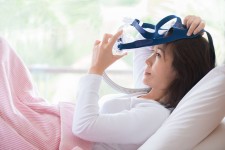Can Invisalign Be Used With CPAP Therapy? Explanations From the Sacramento Dentistry Group

SACRAMENTO, Calif., July 23, 2019 (Newswire.com) - Invisalign is a form of clear orthodontics that wraps around the teeth like an invisible nightguard, instead of poking out above the surface of the teeth like ordinary braces. CPAP stands for Continuous Positive Airway Pressure, and it is a treatment for sleep apnea that uses a pump and mask to force air into the lungs while asleep. A patient recently inquired on the Sacramento Dentistry Group website about whether they could combine Invisalign treatment with CPAP therapy.
Invisalign and CPAP Are Used While Sleeping
For Invisalign to work, the clear aligner that moves the teeth and adjusts the jaw must be worn about 22 hours every day. That means it must be worn while the patient sleeps. For CPAP to reduce the effects of sleep apnea, it must be used while the patient is sleeping. Fortunately, an Invisalign aligner is very smooth, providing little air resistance. It also is custom made, so it fits closely around the teeth. Therefore, Invisalign should not affect CPAP therapy.
CPAP therapy does, however, affect orthodontic treatment. The CPAP machine creates pressure in the mouth. It also may affect the position of the tongue while sleeping. If patients tongue thrust (push the tongue against the teeth) due to the use of CPAP, or if the pressures are high enough, it has been documented that the teeth can be shifted as a result of CPAP therapy. This may affect the necessary length of treatment time when using Invisalign.
The Orthodontic Connection to Sleep Apnea Therapy
The good news is that orthodontic treatment may improve patient airflow while sleeping. For some clients, their airway is small due to abnormally sized arches or other dental malocclusions that affect the tongue position. If these physiological issues are dealt with by the use of orthodontics, some patients have been able to forego CPAP therapy after treatment.
It is very important for all patients to remember, however, that prescribed CPAP treatment should not be discontinued without the consultation of a medical doctor. If CPAP has been recommended, it can be performing a life-saving work for the patient. Therefore, sleep apnea patients should never make decisions about their therapy with first consulting medical professionals. For additional information, contact the Sacramento Dentistry Group at 916-538-6900 or visit their website.
Source: Sacramento Dentistry Group
